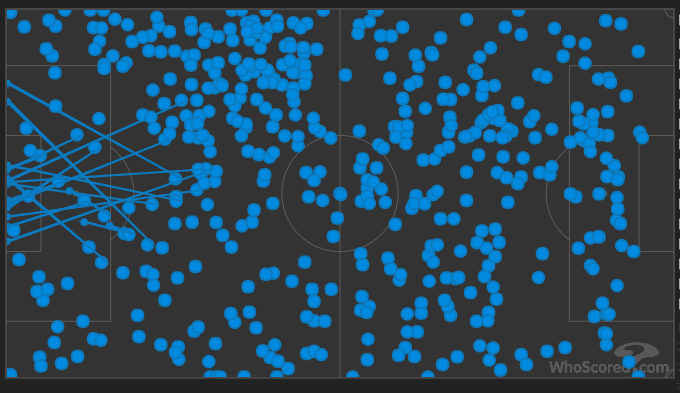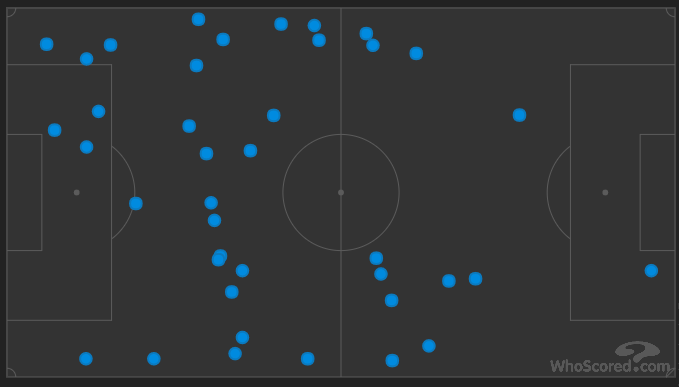Instead, I'd like to focus on football, and why yesterday's tight loss to Brighton was actually really quite good.
First off, Brighton are really good. They're second in the table and they're miles better than anyone other than Newcastle. They have and will beat better teams than Blues.
Blues restricted them to their average of 13 shots, four on target, but of those, only two were inside the box with feet, which I don't need to tell you is the most dangerous shot to concede. Sadly, one of them was rifled in by Anthony Knockaert. That is a little unlucky.
Glenn Murray scoring is something that happens a lot in this league, and yesterday it happened to come from a set-piece in the last minute. It's gutting, but Blues were hardly cut apart by Brighton like at Newcastle.
In fact, this chart from @11tegen11 would suggest that Blues were extremely unlucky to lose this.
Brighton taking two half-chances is just unlucky, and to suggest that Rowett's Blues is somehow impervious to bad luck and would have won that, as I have seen from some Blues fans, is a little silly. I understand the upset, but it's not Zola's fault that our luck is starting to swing.
Even the most hardened Blues fan will tell you that they've been a little fortunate in recent weeks; it seems odd to praise Rowett for Kuszczak having three blindingly good games in a few weeks and yet when those shots go in, it's somehow the manager's fault.
So how did Zola go about it? Blues kept the ball much better than in previous weeks and this helped alleviate some of the pressure put on the defenders. This allowed Blues to restrict the opposition from shooting far more than under Rowett, as quite simply, they had less of the ball. Brighton are where they are because they can and do take apart set defences, and Anthony Knockaert especially is fantastic at it.
Newcastle are similarly good, and we saw what they did to a Blues side who sat back and tried to soak up pressure.
It wasn't until the subs came around the 70' mark that Blues started to sit back and Brighton, as you can see from the above chart, started taking shots and creating, but they hardly took Blues apart - them converting the chances blinds people to that.
Blues lined up in a 4-3-3, and passed the ball much better than in previous weeks. There was a clear structure and plan in the passing and Gleeson got on the ball far more than in previous weeks.
Even the most hardened Blues fan will tell you that they've been a little fortunate in recent weeks; it seems odd to praise Rowett for Kuszczak having three blindingly good games in a few weeks and yet when those shots go in, it's somehow the manager's fault.
So how did Zola go about it? Blues kept the ball much better than in previous weeks and this helped alleviate some of the pressure put on the defenders. This allowed Blues to restrict the opposition from shooting far more than under Rowett, as quite simply, they had less of the ball. Brighton are where they are because they can and do take apart set defences, and Anthony Knockaert especially is fantastic at it.
Newcastle are similarly good, and we saw what they did to a Blues side who sat back and tried to soak up pressure.
It wasn't until the subs came around the 70' mark that Blues started to sit back and Brighton, as you can see from the above chart, started taking shots and creating, but they hardly took Blues apart - them converting the chances blinds people to that.
Blues lined up in a 4-3-3, and passed the ball much better than in previous weeks. There was a clear structure and plan in the passing and Gleeson got on the ball far more than in previous weeks.
Once again, from @11tegen11:
The worry here is how much came down the right hand side, though generally this shows a clear plan and that Blues are able to pass the ball and create a nice network of passing.
David Davis appears to be the weak link here. Where Kieftenbeld created triangles between Stewart and Spector, as well as the midfield triangle, Davis couldn't affect the game as much on the ball. That said, his pressing and tackling ability in midfield can be key and it was he who won the ball back for Kieftenbeld's early chance.
The full-backs played extremely high up the pitch, which was a change too, and we shall see if this continues.
Jutkiewicz is impressive in this chart, as he consistently found himself linking up with team-mates as a target man should.
David Davis appears to be the weak link here. Where Kieftenbeld created triangles between Stewart and Spector, as well as the midfield triangle, Davis couldn't affect the game as much on the ball. That said, his pressing and tackling ability in midfield can be key and it was he who won the ball back for Kieftenbeld's early chance.
The full-backs played extremely high up the pitch, which was a change too, and we shall see if this continues.
Jutkiewicz is impressive in this chart, as he consistently found himself linking up with team-mates as a target man should.
What does this all mean? It means that this, despite the disappointing result and the frustrating way it occurred, was actually pretty good. Some fans will blame Zola's subs - which is fair enough, but I would counter that a Rowett side would have sat back and been beaten earlier in that game. Brighton are really, really good, and Blues restricted them to headers and awkward shots, which is about as much as you can ask for. Blues' lucky streak has started to swing it seems, and that isn't Zola's fault.
This leaves us with January - and I have no idea what will happen in January. I think Zola may try to bring in a midfielder or two; I can't see him persisting with Davis in every game. Another forward appears likely, what with Donaldson's long-term injury and advancing age, and wide-left is a strange position. I don't know if that's where Fabbrini will play - given how narrow Cotterill was, I wouldn't be surprised - or if that's a role for Adams, or maybe Cotterill is the long term plan there.
In conclusion here, Zola's Blues were good but unlucky, we passed the ball a lot better but sadly got bitten by a bit of bad luck - so let's not that fuel the narrative. Back Zola, and who knows, maybe we'll be pleasantly surprised. It might even be better than under Rowett, the truth is none of us know at this moment in time.
This leaves us with January - and I have no idea what will happen in January. I think Zola may try to bring in a midfielder or two; I can't see him persisting with Davis in every game. Another forward appears likely, what with Donaldson's long-term injury and advancing age, and wide-left is a strange position. I don't know if that's where Fabbrini will play - given how narrow Cotterill was, I wouldn't be surprised - or if that's a role for Adams, or maybe Cotterill is the long term plan there.
In conclusion here, Zola's Blues were good but unlucky, we passed the ball a lot better but sadly got bitten by a bit of bad luck - so let's not that fuel the narrative. Back Zola, and who knows, maybe we'll be pleasantly surprised. It might even be better than under Rowett, the truth is none of us know at this moment in time.
As always, @BCFC_RYB or @ElliottBCFC on twitter, and a big thanks to @11tegen11 for the use of his data vis.





